The X-Files 2016: Introduction | 10X1: My Struggle | 10X2: Founder’s Mutation | 10X3: Mulder and Scully Meet the Were-Monster | 10X4: Home Again
This episode was written and directed by Chris Carter. And this episode could only have been spawned from Carter’s mind. “Babylon” is “Fight Club” mixed with “Improbable” mixed with “The After” mixed with post-9/11 political commentary! It also introduces two new characters which will be, for lack of a better word, recurring…(at least) in the one last episode that is left out of this 6-episode revival.
Shroomy spoilers after the jump.
Let’s get some negative points out first, in order to focus on what’s important:
It is now 5 out of 6 and the impression left by the first two episodes remains: the revival was shot in Vancouver but it does not feel as if it was. Apart from some short rural scenes in Founder’s Mutation or the (dry) forest in Were-Monster, this could be Los Angeles for all we know. The tone of this episode was lighter and the photography is accordingly much lighter than in Home Again, however the revival as a whole does not feel as if it made the most out of its shooting location. Perhaps next time they should be shooting during the winter instead of the sunnier, drier summer.
Mark Snow’s music is too present and as often in comedy episodes, his lesser work, the music tries hard to go for comedy instead of leaving the situations and dialogue build the atmosphere. And wasn’t that a citation of Beethoven’s “Letter to Elise” when Scully takes Miller’s card?
Babylon is a one-of-a-kind episode of the likes only Chris Carter contributed to in the series, expanding to the limits what The X-Files is capable of. It is in the vein of his previous episodes that he wrote and directed — the sheer experimental feel of 5X06: Post-Modern Prometheus, 6X03: Triangle, 6X08: How the Ghosts Stole Christmas, 9X14: Improbable — but also drawing from his very worst — the camp of 7X13: First Person Shooter, 7X20: Fight Club. The decision to have a second comical episode in a six-episode limited series is also very surprising. The revival attempts to showcase what The X-Files could be, and we have had mythology, gore-horror, mad science, and comedy; comedy episodes might be crowd-pleasers, however adding another comedy episode gives the whole a bizarre tone, over-representing the lighter aspects and under-representing the darker aspects of what The X-Files was. Only in the most “X-Files lite” period of the show, season 6, was the comedy to “serious” ratio that high. It’s even more unsettling since, between Mulder’s depression, Scully’s mother’s death and their longing for their son, this is perhaps these characters’ darkest period. (All these remarks are not specific to this episode — they are also valid for Were-Monster!) This is, however, The X-Files and radical changes in tone were always to be found between episodes, a freedom that made the strength of the series. This episode is a breath of fresh air before the drama that should unfold in the final episode next week!
Now, let us look beyond this knee-jerk reaction:
Theosophy
At its core, Babylon is about perception: perception of what is truth, of what is good and what is bad, of what is permissible and what is prohibited. Different perceptions and lack of communication between individuals is what begets disagreement and breeds violence. Religion — etymologically “that which binds (people) together” — should bring peace on earth, yet people do not listen to each other (and to God?) and confusion persists. At the episode’s end, Mulder and Scully’s dialogue about life, the universe and everything summarizes the fundamental problem:
Mulder: I saw things, though, Scully. Powerful things. I saw deep and unconditional love.
Scully: I saw things, too. I witnessed unqualified hate that appears to have no end.
Mulder: But how to reconcile the two? The extremes of our nature.
Scully: That’s the question. Maybe the question of our times.
This is a discussion they have been having since the pilot episode. Indeed truth and faith are Chris Carter’s enduring themes shared across all his work.
In this context, the references to Madame Blavatsky in the beginning of the episode (Mulder’s “test” to see if Miller is serious, like with Tad in My Struggle!) make sense. She was the “founder of Theosophism, brought to America a so-called Ancient Wisdom gained from Tibetan spiritual adepts.” The Theosophical Society was founded in 1875; Theosophy is an esoteric philosophy that aimed at exploring comparative religion (the “Ancient Wisdom” that underlays all the world’s religions), to promote the unity of all humans without distinction of race, creed, sex; and to promote the scientific understanding of the universe; its motto is “There is no Religion higher than Truth”; it influenced the New Age movement, among others. Blavatsky described it as “the synthesis of science, religion and philosophy” — a pertinent definition of what underlies The X-Files if there ever was one!
Albert Einstein’s quote is here also very pertinent — apart from being a theoretical physicist, Einstein was also a proponent of international cooperation and federalism, a writer on philosophical and religious subjects, and a socialist. The fuller text of what Agent Einstein quotes is:
The most beautiful thing we can experience is the mysterious. It is the source of all true art and science. He to whom the emotion is a stranger, who can no longer pause to wonder and stand wrapped in awe, is as good as dead —his eyes are closed. The insight into the mystery of life, coupled though it be with fear, has also given rise to religion. To know what is impenetrable to us really exists, manifesting itself as the highest wisdom and the most radiant beauty, which our dull faculties can comprehend only in their most primitive forms—this knowledge, this feeling is at the center of true religiousness.
“Babil al funduq”
Babylon invites us to look beyond appearances: Islamic terrorism on the Western world could be seen as a reaction to Western interference in Middle Eastern affairs and so a punishment of the many for the actions of a few; racism against immigrants is a generalization to everyone for the faults of a few. Is it all a big misunderstanding? Treating anyone, be he a terrorist, like an inferior human being deserving torture or death is exactly the kind of thing that breeds deception and violence in the future. Babylon goes a long way to avoid simplifications of Muslims and Muslim terrorism: not all Muslims are shown as terrorists, of course, and there are also what look like non-Arabs or non-immigrants among the terrorists (a white and a black person).
But it could be argued that all the characters that oppose our four agents are simplifications of right-wing conservatives — the territorial Homeland Security people, the racist FBI Special Agent, the anti-immigration nurse. The episode is not very subtle in condemning these opinions — a “left-wing” reply to the “right-wing” paranoia of My Struggle, or a more moderate response to the all-American post-9/11 hits 24 and Homeland.
Mention is made of the well-known legend of the tower of Babel (Babylon), from the book of Genesis (and so present in all three big monotheistic religions), “scattering people violently, so as never to speak a common language“. The root of “Babel” and “Babylon” is from the Hebrew “balal”, to confuse or to confound. The terrorists are arrested in Hotel Babylon (“Babil al funduq”). Interestingly, the art expo that is bombed in the beginning is called “Ziggurat”: these were the ancient Mesopotamian stepped pyramids, another type of tower. Surely Carter was not endorsing the bombing, but was he commenting on the confusion of the terrorists in their act of violence or of the purposeful provocation of the artists?
Doppelgänger
Babylon feels as if Carter revisited ideas he had in the forgettable Fight Club and enriched them with his love for the characters of Mulder and Scully. 3X13: Syzygy and 7X20: Fight Club centered around bad things happening when doubles got together; the latter also featured doppelgänger versions of Mulder and Scully; 6X08: How the Ghosts Stole Christmas had a couple of ghosts that mirrored the two agents; the Duchovny-penned 7X19: Hollywood A.D. had Mulder and Scully doubles as actors in a movie. Babylon introduces us to two new FBI Agents that are younger versions of Mulder and Scully — the good-looking profiler obsessed with the paranormal, and the red-haired medical doctor that finds all this ludicrous.
“Mulder” is an old form of “Miller” in Dutch. Albert Einstein was of course a scientist like Scully, but Scully also wrote her senior thesis on “Einstein’s Twin Paradox: A New Interpretation”. Of the two, Einstein is the one that is most developed as a character, portrayed magnificently by Clair Fish…er, Lauren Ambrose (of Six Feet Under fame). She is an over-educated intelligent person that not only shares with Scully her impatience with all things paranormal and an acute perception into other people’s minds, but she also sounds like someone pessimistic about herself and her work — babbling about how she will “probably be banished to my own basement office, consigned to a life of ridicule and ignominy…” — a spry nihilism that makes her stand out. Miller is the younger agent, contrarily to Mulder vis à vis Scully; he is more tight-lipped and we get few hints as to his character.
What is interesting compared to previous look-a-likes is the age difference: Mulder and Scully are now experienced enough to serve as mentors, if not parent figures, to a younger generation. Carter delights in the mirrors and couplings that emerge from this situation — Scully is attracted to Miller, Mulder is attracted to Einstein. What is most telling is the time Carter then spends with Einstein and Miller alone, an opportunity to observe the dynamics of a young partnership of agents that reflects that of the older ones, to show their burgeoning intimacy that could develop into a romance, much as they would deny it. Einstein directly comments how obviously in love Mulder and Scully are to outsiders, much like Philip Padgett did in 6X18: Milagro.
But it’s not just this obvious couple that echoes the Mulder-Scully dynamic. Carter takes the archetype of argument-counterargument divide and replicates it anywhere the camera takes us, populating every corner of this episode. It is there between the two television presenters who argue about freedom of speech and the “freedom to hate” and the US Constitution. It is there between the bomber and his mother, the killer of infidels and the pleader for the innocents. It is there between our two now four agents and all the people that want to disturb their work. This action-reaction effect that is everywhere is reminiscent of Improbable and its many scenes of repetitive rhythmic movements, indicating God’s presence in all things.
Patient 23
Mulder and Scully each explore their own way to communicate with the comatose bomber.
Scully, fresh from her mother’s death, chooses neuroscience to set up a protocol of communication. She makes specific reference to “patient 23“: this is a reference to Adrian Owen’s research (see Nature article). Since 2010, he uses functional magnetic resonance imaging (fMRI) and electro-encephalograms to identify brain activity in people into so-called vegetative state, and possibly communicate — the anonymized patient 23 was the most promising case. His group is currently looking at other possible signs of reaction to external stimuli, such as mapping the activity in the brain or measuring pH levels in the mouth. This is cutting-edge science!
Ultimately, Scully (science) does manage to establish a one-way communication — but to go further you need more than that.
Psilocybe tampanensis
The X-Files has had contacts with mushrooms before: there were the Chinese mushrooms that permitted contact with the dead in 2X11: Excelsius Dei; hallucinogenic ayahuasca in 3X18: Teso Dos Bichos; a giant hallucinogenic mushroom in 6X21: Field Trip; the oblique mention to LSD via the name Sandoz, the lab that fabricated LSD in the 1950s-60s, in an episode where Mulder is in a trance, 6X22: Biogenesis; and the marijuana-derived synthetic G-23 in Joe Harris’ comics “G-23“. But this is the first time that psychedelics become a central part of the story — finally!
On his flat-screen TV (gone are the days of the slides projector!) Mulder presents the Psilocybe tampanensis, one of many species of psychedelic mushrooms, “the study of which has begun anew by respected medical practitioners from Columbia University to Oxford.” That is indeed the case: abandoned for decades after the groundbreaking 1960s and 1970s, and classified as a “Schedule I” controlled substance by Nixon in 1970, since the mid-2000s there has been a resurgence of interest in scientific circles to research its effects, particularly on gravely ill patients in order for them to overcome their negative thoughts and existential stress (see New Yorker article, and a video testimony).
“Entheogen” is sometimes preferred term to “psychedelic”: while the latter refers to the mind-altering state induced by the ingestion of such substances, the former refers to the deeply spiritual experience that is akin to “touching the very face of God“.
With all that potential — see ayahuasca trip in Blueberry (Jan Kounen, 2004) or DMT in Enter the Void (Gaspar Noé, 2009) — Carter’s handling is ultimately sub-par. Mulder’s actual psychedelic trip feels very generic, remaining in the framework of a mainstream comedy episode. Alas, Chris Carter’s musical tastes have rarely coincided with mine, and a psychedelic trip to folk and country songs with women objectified as in R&B songs are not my piece of cake. Instead, why not use the Arabic music used in the teaser? That would have been much more original and trans-cultural.
There is some interesting evolution, though: a dizzy happy buzz first, followed by high energy; then Mulder feels he becomes the center of attention of everyone, particularly women, before the dream turns Fifty Shades of Gray mixed with the alien abduction imagery of 2X05: Duane Barry (and now 10X1: My Struggle)! Appropriate for somebody addicted to porn (and for the lead actor of Californication?). And only after this very campy but definitely funny first part does the trip turn to more serious visions.
Some additional thoughts:
- Scully references the “Magical Mystery Tour“, a Beatles album, itself referencing drug use
- What Mulder calls Einstein, a “mugwump“, is not only an antiquated derogatory term, it is also the name of the horrific magical creatures in William S. Burrough’s “The Naked Lunch” (see also David Cronenberg’s film adaptation); the addictive fluid they secrete is a psychedelic drug that enhances creativity, resulting in the writing of…”The Naked Lunch“!
- The appearance of the Lone Gunmen was a blink-and-you’ll-miss-them cameo!
- The rowers on that boat, black hooded figures, are reminiscent of elves. People who have consumed psychedelics — DMT in particular, which is related to psilocybin — often refer to getting in contact with elves, faeries, even extraterrestrials. See Terrence McKenna’s “machine elves”; and the Mexican name for the psilocybe mushroom, “little people”, or “little saints”.
- Einstein mentions an “early research pioneer” on mushrooms that is from Texas — I haven’t found out who that might be!
Of course, Carter injects additional ambiguity on whether Mulder did take it — was it real or did Mulder just “want to believe”? a typical Carter ploy — but I’d like to think that Einstein was protecting her career by mentioning the placebo, and so was Carter (one can’t simply go around praising the benefits of an illegal drug on prime-time television).
“The After” connections
The tone is different, however Babylon might be lending elements that were in Carter’s mind during the development of his cancelled Amazon series “The After” (covered at EatTheCorn here).
In the beginning and end, we hear what are like sirens coming from the sky — God’s sirens of the Apocalypse, as Mulder quotes: “And I saw the seven angels that stood before God, and to them were given seven trumpets.” There have been various reports and recordings of odd sounds all around the world. Is the Apocalypse coming? We will see next week — playing on the parallel between aliens-as-God and the alien colonization as Apocalypse.
Such powerful blowing sounds were also featured during the event that spreads chaos and kicks off “The After“. “The After” was purposefully coy about what was that event — alien invasion, military invasion, technological accident, religious apocalypse — however Christian themes were certainly to have played a big role in the series had it been made. Carter had declared that “The After” would have been based on Dante’s Divine Comedy, or just its first part, Inferno (Hell), perhaps describing an earthly version of the supernatural Hell. Dante also reused Greek mythology, featuring the rivers Acheron and Styx, which the souls had to cross in order to reach the Underworld, guided on a boat by Charon (a myth itself reusing elements from Egyptian mythology). The connection with Mulder’s dark vision of a rowing ship is evident.
With that Tom Waits song (the excellent “Misery Is the River Of the World“) at that point, I can’t help but recall Terry Gilliam’s “Imaginarium of Dr. Parnassus” where Tom Waits portrayed the Devil himself, with the Acheron-crossing scenes that go with it! Of course, here Charon is the CSM!
Mulder’s God & Mother Love
The ending is most reminiscent of 9X14: Improbable. That episode ended with, essentially, a zoom out of the microcosm of human affairs, to reveal God’s face, showing that God is everywhere. Here, Mulder hears God’s trumpets, and we zoom out to see Earth and the heavens, all of God’s creation. It is the reply to the ending of 3X11: Revelations, where Scully was “afraid that God is speaking, but that no one’s listening“; finally, somebody is listening!
What does that mean for Mulder’s religious beliefs then? This was a matter meticulously avoided in the past: Scully was the religious one, while Mulder was the one believing anything but taking a second seat when the subject matter was religion. Here, Scully explicitly asks “Since when do you believe in God, Mulder?” and Mulder “defensively” reacts as being interested in this in the same way he is interested in any other paranormal or supernatural or alien story. Mulder and Scully’s beliefs progressively converged, in particular when it looked like the series was coming to an end: see Mulder’s musings about God in relation to William’s birth in 8X20: Essence, or Mulder’s “we believe the same thing” while holding Scully’s cross in 9X20: The Truth. This not being “the end”, Mulder and Scully’s divergences are again apparent, and Mulder is the less religious one.
Given his interest in the supernatural and the mystic, Mulder might believe in a higher power or higher powers, he might be an agnostic; he certainly does not embrace a specific organized religion or definition of “God”. In that sense, Scully’s quip makes sense only if she is referring to her own specific God, the Christian one — unfortunately, the confusion between the two happens only too often in US media, and Carter being a Christian that does not surprise me. In keeping with the episode’s theme of universality, Mulder hearing the trumpets at the end does not automatically make him Christian, but it does bring him closer to the monotheistic God.
There is one additional element connecting religiosity, Mulder’s visions and the psychedelic mushrooms: Mulder’s mention of “Mother Love“. In the end, he talks of “mothers have a greater purpose“, and it is not only about the education parents should give to their children. Everything in the episode points towards the “ancient wisdom” and the commonalities between religions. It hearkens back to the origins of religion, to the time of the Shamans, when humans consumed entheogens in search of spiritual experiences, in search of “God”. And many of the early religions were not centered around a patriarchal “father creator” but around a mother goddess — mother nature, mother Earth. From Mesopotamia to Greece to Rome to Christianity, the figure of a loving mother holding her child has endured. The mother holding her son in Mulder’s vision is not only a recreation of Michelangelo’s Pietà, it is also another iteration in a belief that goes a long way back. And echoing myths shared by many cultures around the world and whose origin is lost in the mists of time, Mulder the hero has gone on a journey that brings him to the Underworld, where he collects the information necessary to vainquish his enemy. [Edit: more interesting parallels and references to ancient mythology in Babylon can be found in Chris Knowles’ blog here).]
Closing thoughts
The subject Carter chooses to approach these themes — terrorism — is topical and very serious but the tone is very light. Carter appears supremely optimistic and candid, yet that is inescapable when formulating such absolutes such as “love conquers all” or “love thy neighbour”. In Babylon, his love for his characters shines through. In another context this would have been the “shippiest” episode ever; here it becomes a love letter to the characters he has created, leaving them in a positive light as if this were the last chance he would have to do so. In dealing with truth, perception and faith in a novel way, this episode manages to be an encapsulation of everything in The X-Files!
Despite its many shortcomings, it’s a wonder Babylon exists! Where else would you see a Mother Goddess recreation with a Jihadist as Christ in a vision induced by entheogenic mushrooms?
Tags: xfilesrevival
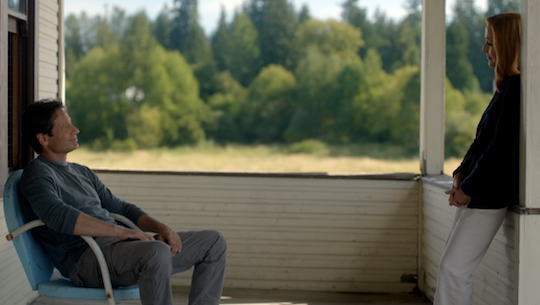
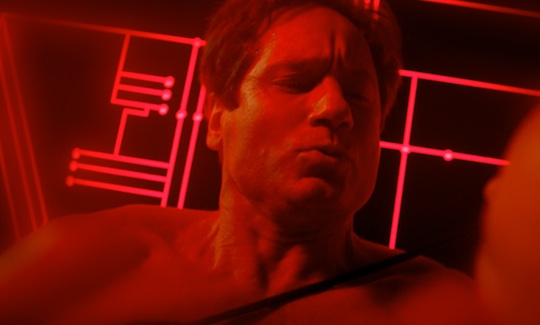
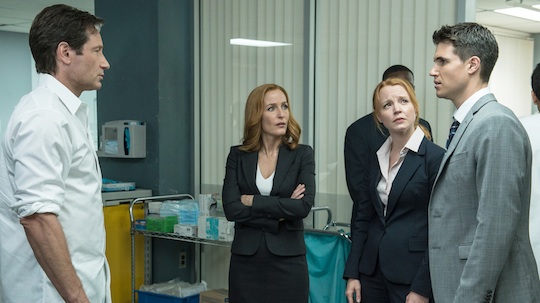
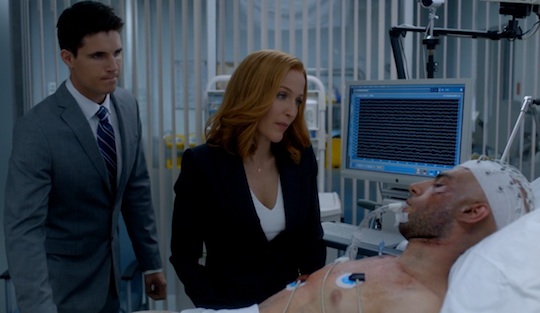
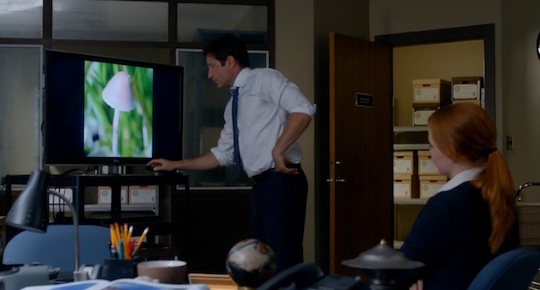
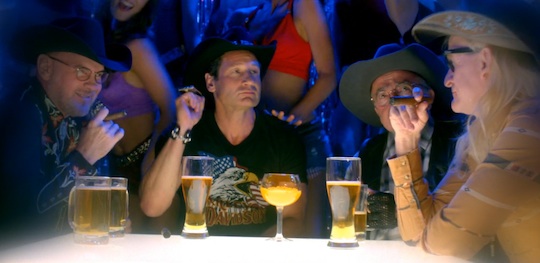
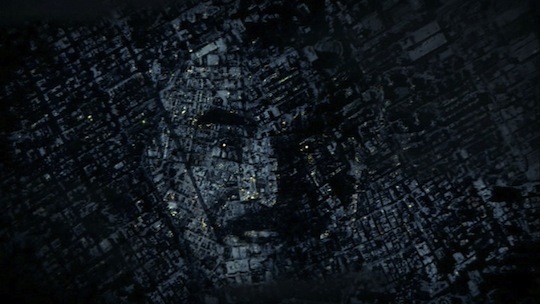
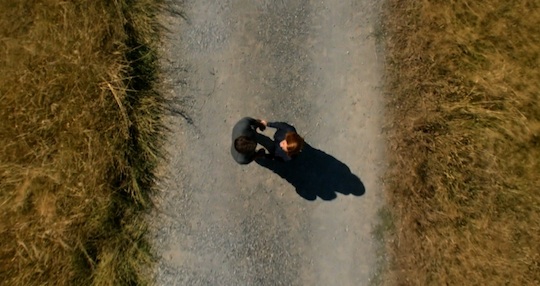
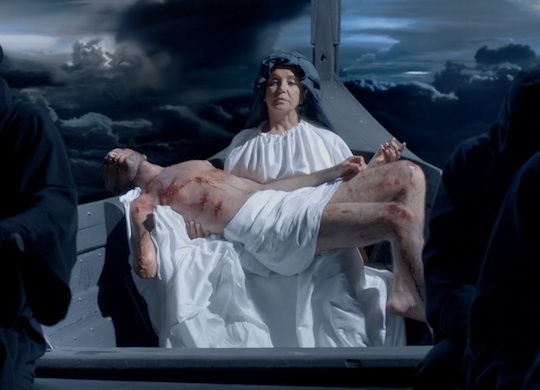
It’s so unfortunate that the attention to this episode was so negative because people are not willing to think about deeper subject but simply touch on the surface material. I am happy there are still intellectuals in the X-Files fandom.
Thank you! There are far too many folk/country songs here for me to appreciate the episode fully, but it is much better than most critics have made it out to be.
Very nice review. I enjoyed that immensely. I think Carter’s quirky style sometimes masks some of the truly deep approaches to topics he is taking, and you did an excellent job of weeding through that. This episode is definitely better, not flawless, than many out there have given it credit for. I’m looking forward to my rewatch of it even more now.
That’s my objective, to make people enjoy the episodes more! Although the episodes shouldn’t need long-winded detail-obsessed analyses to be enjoyed.
Thank you for this review. I liked the episode right from the first time watching, was amazed of the so many details and hints and thoughts Chris Carter had put in it. He was saying so (maybe to) much, one just needs to listen. I rewatched it now for the third time and have to agree with (almost) everything you said. Even the shown stereotypes with the texans and the psychedalic trip scene (one could argue about) I just felt that he is holding a mirrow in our faces making us think about our own prejudices. One little detail (I don’t even know if it is on purpose) is the scene in the hospital when the camera sooms in the room where the nurse is shutting down the life support and the only three letters left to see on the door are WAR. And the trumpets at the end really said it all for me where the last episode will be going. This episode is one of the few that really got me think a lot about it and I’m very glad that there are people who are thinking as well.
Thanks!
“WAR”: that’s the kind of detail that fans could debate endlessly on whether it was on purpose or not — nevertheless, nice find.